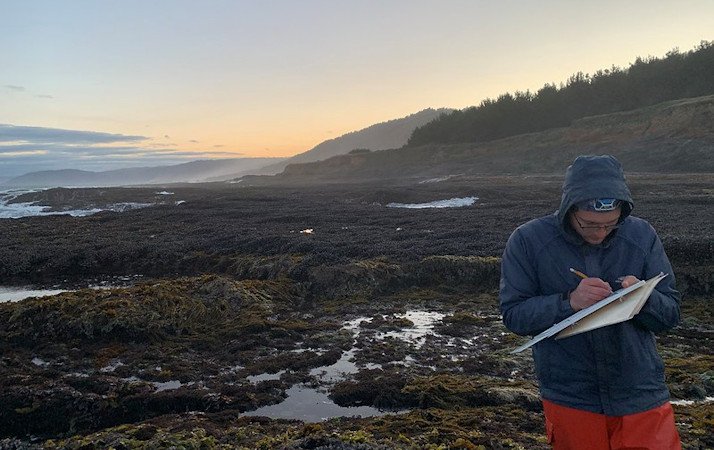Rocky shores of Pacific Northwest show low resilience to changes in climate, OSU researchers say

CORVALLIS, Ore. – A 15-year period ending in 2020 that included a marine heat wave and a sea star wasting disease epidemic saw major changes in the groups of organisms that live along the rocky shores of the Pacific Northwest.
The study by Oregon State University scientists, involving four capes in Oregon and California, suggests these communities of species may have low resilience to climate change. Findings were published Monday in Nature Ecology & Evolution.
Researchers learned that sessile invertebrates – those that stay in one place, such as mussels and barnacles – became more abundant during the study period, while seaweed species like kelps declined.
“These changes occurred after the loss of adult ochre sea stars due to an epidemic of sea star wasting disease and during a three-year marine heatwave when water temperatures were extremely warm,” said Zechariah Meunier, a doctoral graduate of the OSU College of Science and the lead author on the paper. “Sea stars are like the wolves of rocky shores because they normally eat enough mussels and barnacles to prevent these invertebrates from dominating the lower elevation areas. And many kelps did not survive the thermal stress during the heat wave.”
Of further concern to the scientists: When the epidemic ended and ocean temperatures cooled, the rocky shore communities did not return to their baseline conditions. That suggests the communities have low resilience to changes in both temperature and predator numbers.
“Diminishing resilience may lead to degraded rocky shore communities under future climate conditions,” said Meunier, who along with OSU professors Sally Hacker and Bruce Menge looked at 13 sites spread among Oregon’s Cape Foulweather, Cape Perpetua and Cape Blanco and California’s Cape Mendocino. “And a warming climate will make restoring baseline conditions more difficult – regime shifts to degraded states are likely to last longer and put community structure and ecosystem function at risk.”
Hacker and Menge have been studying Northwest coastal ecosystems for decades. Healthy marine ecosystems are important because the ocean, and the species that live in it, are critical to the proper functioning of the planet. For example, the ocean supplies half of the oxygen humans breathe and annually absorbs one-quarter of the carbon dioxide people emit into the atmosphere.
The scientists note that climate change and pollution are combining to force marine ecosystems to experience unprecedented stressors including harmful algal blooms, ocean acidification and hypoxia. The stressors often work in concert and exacerbate one another, resulting in damage to marine habitats or species diversity loss.
When stressors are especially severe, they can lead to habitat transitions from one state to another in what’s known as a regime shift.
“A classic example of multiple stressors causing a regime shift is the transition from kelp forests to urchin barrens in the Pacific Ocean off the west coast of North America,” Meunier said. “That transition is attributed to a marine heat wave, urchin overgrazing, historical extirpation of the sea otter and recent mass mortality of the sunflower star. Digging even deeper, the sunflower star demise was itself driven by two stressors: a sea star wasting disease epidemic and a marine heat wave.”
While sunflower stars have not recovered, adult ochre sea stars on rocky shores are growing in size and number to what was measured before the disease epidemic. Thus, there is hope that the sea stars will be able to limit the expansion of barnacles and mussels in the future, the researchers say.
The study by Meunier, Hacker and Menge was funded by the National Science Foundation.